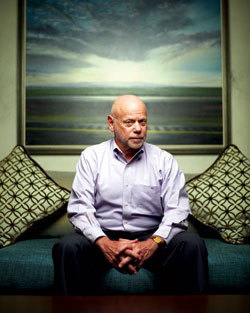Labor lawyer lands a labor of love—planting mediation firmly in India

Victor Schachter: “The key is sustainability. What’s critical is to build [something that’s] sustainable when we leave.” Photo by Jeff Singer.
Meditation in India? Om, big. Mediation in India? Um, not as big.
That, however, is changing, thanks to Victor Schachter, a labor and employment partner at Fenwick & West in Mountain View, Calif. Schachter set up the first court-annexed mediation centers in India, and he plans to follow suit in additional countries through his just-launched Foundation for Sustainable Rule of Law Initiatives.
Because of Schachter’s work, more than 150,000 cases have been mediated in India since 2006. “Settlement rates range from 55 to 65 percent, depending on the nature of the case,” Schachter says. “That reflects the major impact on literally hundreds of thousands of people as these cases are being processed and settled, rather than having them linger in the courts in a state of disarray.”
Schachter’s global mediation work began as a fluke. In 2002, a partner at Fenwick couldn’t make it to a show-and-tell for Malaysian judges observing American alternative dispute resolution procedures, and Schachter filled in. That led to an invitation to discuss mediation and case management in Brazil and then Turkey, followed by Malaysia and, ultimately, India.
“One focus was to explain how court-annexed mediation works to unjam backlogged court systems,” Schachter explains. “The second aspect was to work with judges on case-management procedures, which in the United States we take for granted and are pretty strictly managed from the court. In many countries, however, it’s lawyers who manage cases. They get completely out of control with the backlog.”
MOVING IN
In 2005, India’s chief justice committed to creating mediation centers throughout the nation. Schachter and his wife moved to New Delhi for two months, and Schachter helped create two mediation centers from scratch.
“Our first court was in Tis Hazari with four floors, 200 judges and hundreds of monkeys running around stealing food and occasionally biting people, which was no small matter because of the infections that might ensue,” he says. “It was chaos. “We trained judges for 40 hours, set up the physical center, and then trained administrators on how you receive people and process cases—and, if there’s a settlement, how you make it enforceable. We had to set up procedures in coordination with the court so that within 24 hours, the settlement went to the court and was an enforceable judgment.”
Since then, Schachter has done similar work in Bangalore, Kochi and Hyderabad.
The program’s biggest success may be that marriage disputes are among those mediated, though Schachter was reluctant to tackle them at first.
“We took them on at the insistence of one particular supreme court justice who said it was important we do this work both culturally and societally,” recalls Schachter. “You’re dealing with human rights. A woman who’s divorced in India is tainted for the rest of her life without the right to marry. The women I ran into, even if abused, didn’t want a divorce. Often husbands would try to throw them out of the house and wouldn’t give them a divorce.”
Marital disputes don’t just involve spouses. “You have people in extended family relationships, and everybody piles into the room,” Schachter explains. “You could be dealing with a woman who’s physically abused, and there are both criminal and civil matters that may have been pending for five to 15 years. We had one pending for 24 years. We bring the community and family in, and arrange for maintenance and for the women to go back to be credible members of their community so they can put their lives back together. We’re settling these cases at an astounding rate of 50 percent.”
After turning 70 last October, Schachter told Fenwick he wanted to devote a major portion of his practice to his foundation. He was moved that the response was a substantial donation and an offer to serve as the foundation’s counsel pro bono.
The focus for the next year will continue to be on India. But Schachter says he’s been contacted about expanding into Kazakhstan, Macedonia, South Africa and Turkey. And he recently received an invitation to perform his “mediation building” work in Kosovo and nearby Eastern European countries, where he is scheduled to travel in October.
“The key is sustainability,” Schachter says. “What’s critical is to build what’s sustainable when we leave. We respect the nationalism of these countries. We get in, build it and get out.”



